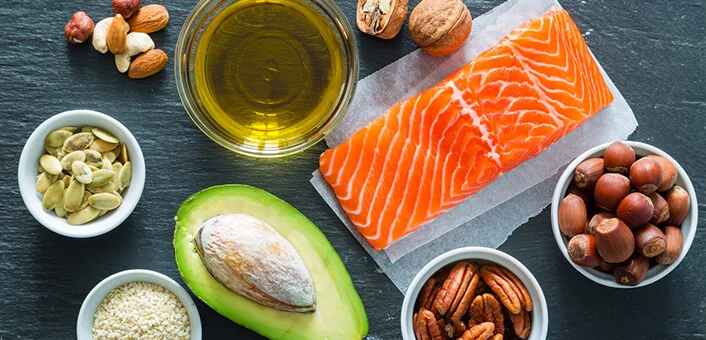
Living Well
10 Reasons Why Eating Fat Won’t Make You Fat
Oct 13, 2017We’ve long been told that eating fats makes us fat, and can contribute to cardiovascular disease. But it’s time to debunk that myth! A growing body of research now proves that eating the right kinds of dietary fat offers immense health and weight-loss benefits. Yes, you’re right; fat is good for you. Let us find out why your diet needs to include lots of eggs, nuts, healthy oils, ghee, butter, avocados, and other delicious fat sources!
We NEED Fats
Forget everything you’ve read about eating fat making you fat.
The human body needs dietary fats, which is precisely why many of them are called ‘essential fatty acids’. Ever heard of ‘essential carbs’ —- we bet not!
“Essential” means that the body requires them for a variety of processes, but cannot manufacture it on its own. And that’s why you need to get essential fatty acids from your diet.
Fat is good for you as it helps in several ways, including:
- Improving fat-soluble vitamin uptake
- Maximize metabolism
- Provide fuel and energy for the body
- Insulate your body to keep it warm
- Maintain skin health
- Help the body absorb nutrients
- Optimum nerve, brain and heart function
So you see — dietary fats aren’t ‘optional’ — you need them to maintain your health and wellbeing. And that includes saturated fats as well. Yup, you heard us right. Today, scientists have debunked the old U.S. Dietary Guidelines (and nutrition labels), because they found no scientific link between eating saturated fats and increased risk of heart health.
10 Reasons Why Fat Is Good For You
Here’s what Dr. Mark Hyman, the author of ‘Eat Fat, Get Thin’ and the director of the Cleveland Clinic’ s Center for Functional Medicine, believes why fat is good for you. Dr. Hyman believes people should never have stopped eating fat. He is an outspoken advocate of the health benefits of eating fat. His book ‘Eat Fat, Get Thin’ takes a deep dive into the science behind dietary fat, debunking decades of confusing health recommendations. His book also builds a case for why all fats – even saturated fats, which have long been vilified – should be a part of a healthy diet.
Below, we share 10 reasons why fat is good for you, summarizing Dr. Mark Hyman’s ideologies.
The Reason You’re Fat is Not Fat; It’s Sugar
We have made fats to be the villains causing obesity, but that couldn’t be further from the truth. In reality, its refined sugars and processed carbs that lead to unhealthy weight gain – not dietary fats. Sugars and carbs all break down into simple sugars upon digestion. All this excess sugar in your blood leads to insulin insensitivity, because it’s hard for an average human to burn all the sugar we eat. The result — the body stores the excess sugars as fat, while all the extra circulating insulin leads to insulin resistance and metabolic mayhem.
Low-Fat Foods Tend To Be High In Sugar
When you remove fats from any food, you need to add something extra to make it taste good and make you feel full. That ‘something extra’ is often hidden sugars. Low-fat diet foods that are sugary and starchy are worse for your heart health. In fact, a national study from 2007 showed that nearly 75% of patients hospitalized for a heart attack had normal cholesterol levels, according to current national cholesterol guidelines. What they did have was elevated blood sugar levels to be either pre-diabetic or type 2 diabetic. Lesson – eat fat and ditch the sugar.
Fat Is Complex
All sugars – be it natural sugars or artificial sugars, cause the same damage to your body. Sugar is simple, and digests simply to elevate blood sugar levels. On the other hand, fat is more complex. You have saturated, monounsaturated, polyunsaturated and even trans fats. While not all of them are good for you, they undergo a more complex digestion process. And they can be crucial for maintaining satiety and metabolic health.
Fats Are Crucial For Brain And Nerve Function
The right fats will improve brain function and proper nerve signaling. The brain is made 60% of fats, out of which a large chunk is docosahexaenoic acid (DHA) or Omega 3 fats. Research has linked Omega 3 fatty acid deficiency to a variety of mental problems – including depression, anxiety, bipolar disorder and schizophrenia. Similarly, these omega 3 fatty acids also aid in nerve function, communication and protection, according to studies.
Fats Can Help You Lose Weight
Adding fats to your diet, while cutting back on carbs, can be the secret to getting lean. This is another lesser-known fact why fat is good for you. At Sepalika, we are staunch supporters of the LCHF or Low Carb-High Fat diet, which helps improve insulin senstivity, and lose weight. Good fats help mobilize stored fats to be used for energy, improve insulin function, and provide satiety which helps with appetite control. Eat a meal laden with good fats and you will feel full faster and for much longer. And because fats take far longer to digest when compared to carbs, you will eat smaller portions and not get hungry anytime soon after your meal.
Fats Are Crucial For Sexual Health
Fats are the building blocks for healthy cell membranes, but they are also important for hormonal health. Our sex hormones – testosterone, estrogen, progesterone – are all made of cholesterol. Cutting way back on dietary fats can increase your risk of hormonal problems like hypothyroidism, menstrual irregularities, PCOS and low testosterone levels for men.
Build Stronger Bones With Fat
Do you eat a bone-strengthening supplement, hoping it’ll help with stronger bones to reduce the risk of osteoporosis and arthritis in the future? Well, most of these, like calcium, need FATS to be effectively incorporated into bones! This is because the important bone-building vitamins – Vitamin A, D, E and K are only fat soluble, which means they are transported and absorbed using dietary fats. Fats are needed for the metabolism of calcium.
Saturated Fats Are Often Misunderstood
There’s no reason to be afraid of saturated fats. Research now shows that there is no correlation between saturated fat and heart disease. However, not all fats are created equal, and this holds true for saturated fats as well. A greasy cheeseburger from your fast-food joint doesn’t contain the same heart-friendly saturated fats as a tablespoon of coconut oil. So don’t classify all saturated fats as the same.
You Need More Omega 3 Fats
This obsession with the ‘good’ fats – namely polyunsaturated fat – could be doing you more harm than good. That’s because polyunsaturated fats include both healthy Omega 3s and inflammation-causing Omega 6s. Yes, you do need both kinds. But researchers have found that a typical Western diet has a ratio of 15/1–16.7/1 (omega6:omega3), making them deficient in omega-3 fatty acids. On the other hand, we may be eating excessive amounts of omega-6 fatty acids, compared to the diet on which human beings evolved. Aim to incorporate more Omega 3 rich foods in your diet to optimize your health.
But Do Avoid Trans Fats
On the other hand, Trans Fats from inflammatory vegetable oils are best avoided. You should eliminate any refined oils, vegetable oils, and trans-fats like margarine found in baked goods from your diet, as these are linked to low-grade chronic inflammation.
The Final Word: Eat The Right Fats
Now that we have established why fat is good for you, let’s talk about how to eat the right fats.
We recommend the principles of Weston Price Diet. We believe that the preferred ratio of Saturated-Monunsaturated-Polyunsaturated fats in a healthy diet should be 6:4:1.
If you consider that the average person needs 2400 calories/day, then 160 grams or 60% of calorie intake should come from healthy fats. That means you should ideally eat 11 tablespoons of the right fat per day.
List Of Healthy Fats:
- High- quality Saturated Fats, from sources like grass-fed butter, coconut oil, ghee, and animal fats cooked with meat. We recommend 6 tablespoons per day.
- High- quality Monounsaturated fats, from sources like peanut oil, sesame oil, and olive oil. Always choose cold pressed oils; never opt for cheaper heat or chemical extracted oils. We recommend 4 tablespoons per day.
- High-quality Polyunsaturated fats, from sources like cod liver oil, flaxseed oil, and evening primrose. We recommend 1 tablespoon per day.
You can also find high-quality fats in nature. Avocados and nuts are other good sources of Monounsaturated fats. Sunflower seeds, flaxseeds, pumpkin seeds, chia seeds, walnuts and fatty fish like salmon, mackerel, herring, albacore tuna, and trout are other good sources of Omega-3 rich Polyunsaturated fats.
So don’t be a fat-phobe. Eat healthy fats with every meal to improve your heart health, brain function, nerve function, mood, skin and hair.
If you have recently switched to a high fat-low carb diet and experienced first-hand the many benefits of increased fat intake, we would love to hear from you!
References:
Dietary Fats and Health: Dietary Recommendations in the Context of Scientific Evidence – https://advances.nutrition.org/content/4/3/294.full
The importance of the ratio of omega-6/omega-3 essential fatty acids – https://www.sciencedirect.com/science/article/pii/S0753332202002536
Making a Case for Eating Fat – https://well.blogs.nytimes.com/2016/03/04/making-the-case-for-eating-fat/
Most Heart Attack Patients’ Cholesterol Levels Did Not Indicate Cardiac Risk – https://www.sciencedaily.com/releases/2009/01/090112130653.htm
Meta-analysis of prospective cohort studies evaluating the association of saturated fat with cardiovascular disease – https://ajcn.nutrition.org/content/91/3/535.abstract
Omega-3 fatty acids: evidence basis for treatment and future research in psychiatry – https://www.ncbi.nlm.nih.gov/pubmed/17194275
Long-chain omega-3 fatty acids and the brain: a review of the independent and shared effects of EPA, DPA and DHA – https://www.ncbi.nlm.nih.gov/pubmed/25954194






